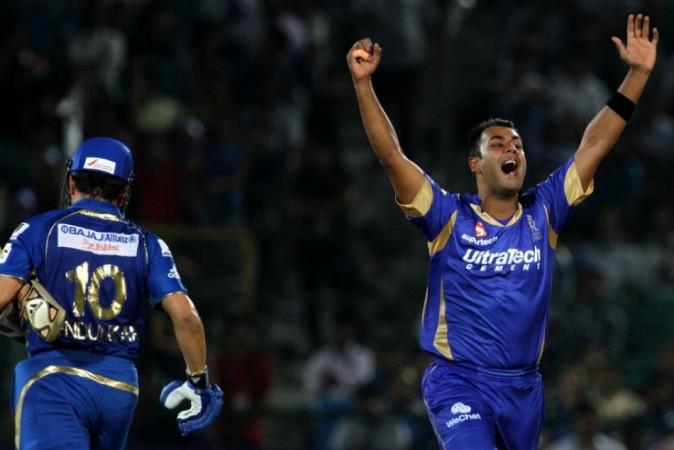
The two Indian legends, playing in their final T20 tournament, could not quite turn back the clock, but it was Rahul Dravid who ended up the happier after the Rajasthan Royals saw off the challenge of Sachin Tendulkar and the Mumbai Indians in the opening match of the Champions League T20 (CLT20) in Jaipur.
Much has been spoken about the two greats of cricket bidding goodbye to the shortest of formats at the end of the CLT20, but it was the youngsters again that impressed the most with Sanju Samson yet again showing his immense talent to guide the Royals to a seven-wicket victory.
Samson (54) and Ajinkya Rahane put together a solid partnership after Dravid fell early on as the Royals reached their target of 143 in 19.4 overs after the Mumbai Indians finished their first innings on 142 for seven.
The Royals did not panic after losing Rahul Dravid pretty in the second over - the skipper captain striking a cut straight to Kieron Pollard at point off Nathan Coulter-Nile.
Ajinkya Rahane and Sanju Samson, showing maturity beyond his years, took their time while playing some incisive shots and making sure the run rate did not get too far ahead of them.
There were a few lucky moments here and there, with Samson in particular lucky to survive an lbw shout off Mitchell Johnson early on - but the two batsmen read the situation perfectly to take their side ever closer to victory.
Rahane (33, 31b, 3x4, 1x6) and Samson put on 74 in just under ten overs, which kept the home side very much on course for an opening CLT20 win.
The more experienced Rahane fell to Rishi Dhawan in the 12th over, dragging one on, but Samson, all of 18, carried on unfettered.
Shane Watson came in to give the youngster company as the Royals inched ever closer to victory.
Samson finally fell in the 16th over for a well-played 54, 47b, 8x4), with the batsman skying one to Dwayne Smith off Pollard.
The Royals needed 36 from 27 balls at that point and Watson (xx), in the company of Stuart Binny, eased their side to victory with plenty of balls to spare.
The Mumbai Indians did not make the best of starts and there was no flash and class from Sachin Tendulkar on view, unfortunately, either.
Dwayne Smith (9) did not last too long for the IPL champions, playing an ill-advised shot across the line, to a ball that kept pretty low off Vikramjeet Malik, and finding himself trapped in front.
Tendulkar (15, 17b, 3x4) looked to be aggressive right from the off and there were a few shots that went right off the middle of that massive bat of the Little Master.
It looked for a little while like the Jaipur crowd could be in for a Tendulkar special, but the lack of match practice told in the end as a nice out-swinger from Stuart Binny induced an edge which was happily gobbled up by Sanju Samson behind the stumps.
The openers' wickets were sandwiched by the dismissal of Dinesh Karthik, whose unconvincing stay at the crease was ended by the impressive Malik (three for 24).
The Mumbai Indians got themselves into deeper trouble by unnecessarily creating the run out of Ambati Rayudu following confusion with skipper Rohit Sharma as the away side tottered on 43 for four.
Sharma (44, 37b, 3x4, 2x6) and Kieron Pollard then steadied the increasingly sinking Mumbai ship with a 52-run partnership from 7.3 overs as MI looked to keep some wickets in hand for the final assault.
The Mumbai captain, just when he looked like in the mood, fell in the 16th over, edging one off Shane Watson right after smashing the bowler for a six as the onus fell completely on Pollard to fashion the last-minute hitting.
Pollard (42, 36, 4x4, 2x6) nearly went berserk in the final overs, with a couple of fours and sixes each before the excellent Malik again got rid of the big West Indian in the first ball of the last over.
Nathan Coulter-Nile, though, came in and struck a six and a four to push the score beyond the 140-mark.















